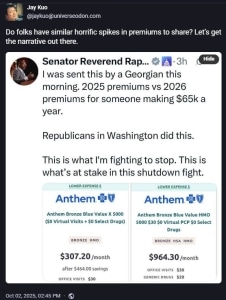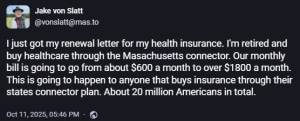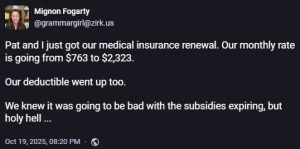[NB: check the byline, thanks. /~Rayne]
There’s been an uptick this week in reporting on the role of health care subsidies in congressional budget negotiations.
Most Americans worry about health care costs: AP-NORC poll
By ALI SWENSON and LINLEY SANDERS | Updated 1:22 PM EDT, October 21, 2025
https://apnews.com/article/poll-shutdown-health-care-insurance-costs-trump-f0282a0f5bedf3f01172ed3fa0ba4fd2
Health insurance sticker shock begins as shutdown battle over subsidies rages
Many states have shown rising premiums ahead of open enrollment for Affordable Care Act plans. Congress is deadlocked over extending covid-era subsidies that bring costs down.
By Paige Winfield Cunningham | October 22, 2025 at 6:00 a.m. EDT
https://www.washingtonpost.com/health/2025/10/22/obamacare-aca-enrollment-price-increases/
Some Americans fear high health insurance premiums if ACA enhanced subsidies expire: ‘Very much a worry’
ACA enhanced premium tax credits are set to expire at the end of the year.
ByMary Kekatos | October 21, 2025, 10:51 AM
https://abcnews.go.com/Health/americans-fear-high-premiums-aca-enhanced-subsidies-expire/story?id=126613026
News media are finally telling us what many of us have already known: Trump’s GOP congressional caucus wants to kill Americans.
There are some GOP moderates who are pressing for some, well, moderation on health care subsidies because their constituents need the assistance.
Republican moderates press leadership on health credit extension
Millions of Americans in red states rely on subsidies to keep insurance costs down
By Sandhya Raman and Jessie Hellmann | October 22, 2025 at 12:36pm
https://rollcall.com/2025/10/22/republican-moderates-press-leadership-on-health-credit-extension/
And these moderates need their seats. Check the last graf of that RollCall article — it’s a who’s who of GOP seats in districts that are flippable.
In other words, the state of health care subsidies may mean control of the House.
Trump refuses to negotiate unless the government shutdown ends, but that means giving up the only leverage Democrats have since the moderate GOP reps have been unable to persuade Trump and the rest of the GOP House caucus to budge.
Meanwhile, reality is doing a number on Americans who rely on health care subsidies, including small business owners:
These kinds of rate increases mean households will be making choices between going without health care insurance or going without paying mortgages, skipping car payments, not making the rent, cutting back on groceries they haven’t already cut because of inflation.
Do the math:
— Median weekly earnings for wage and salary workers = $1196 / week
— Average rent for a one-bedroom apartment in the U.S. = $1631 / month
— “The USDA estimates $297–558 for a monthly food budget for one person, $614–963 for a couple, and $996–1,603 for a family of four.” (This number was reported in May 2025 and has surely risen since the underlying source report.)
— Average transportation cost per U.S. household = $819 / month
That’s just the basics and doesn’t include out-of-pocket health care expenses, or any other necessities like clothing. It’s extremely grim for minimum wage workers, and for those whose work fluctuates like freelance writers or seasonal contractors.
There’s almost nothing left or worse after rent and/or health care, and it will be worse in rural areas.
Imagine having to choose between feeding your kids and getting any necessary medication including insulin. Imagine trying to pay for prenatal care let alone delivery of a healthy child, and making the rent. Heaven help you if either you or the child suffer complications before/during/after birth.
For many of us this isn’t a thought experiment. It’s a painful reality. Some of us will have to work even longer to pay for health care, well beyond age 65; some of us are already dealing with this challenge, as Business Insider reports in these slice-of-life stories that tend to blame the victim (ex. Faber shouldn’t have been a farmer).
I’m 82 and earn $16 an hour working at a boat store. I don’t have much saved and can’t retire, but everything will work out.
https://www.businessinsider.com/cant-retire-working-at-80-social-security-minimum-wage-2025-10
A trucker in his late 70s who can’t afford to retire shares the big regret he made decades ago that may have changed his circumstances
https://www.msn.com/en-us/money/retirement/a-trucker-in-his-late-70s-who-can-t-afford-to-retire-shares-the-big-regret-he-made-decades-ago-that-may-have-changed-his-circumstances/ar-AA1HKHOP
These folks couldn’t save enough for retirement when health care costs were much lower. Today’s younger workers aren’t able to save much at all, not with inflation chipping away at all their expenses. We’ll be reading bleak stories of elderly who can’t retire for decades.
In essence, Trump and his GOP minions’ death panel have become Dickensian: “If they would rather die, …they had better do it, and decrease the surplus population.”
One might think this is the Trump-GOP’s approach to housing policy; if enough people go bankrupt, into foreclosure, or die, there will be more housing available.
It’s as destructive and thoughtless as taking a wrecking ball without a plan to the East Wing of the White House.


